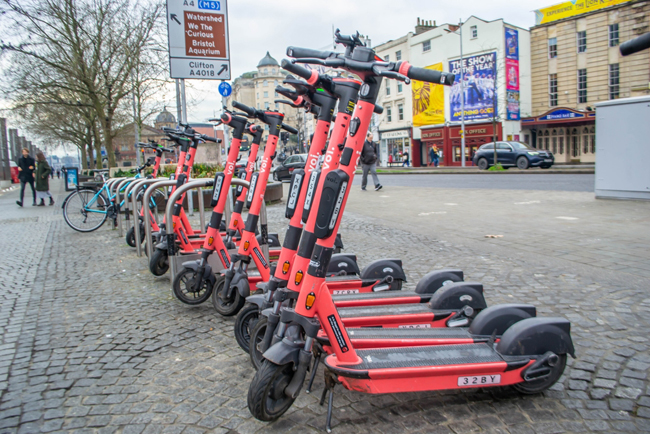E-scooters have become an integral part of our cities since the introduction of trials in the summer of 2020. As a more sustainable form of transport, e-scooter use has increased exponentially, and e-scooter trials have had an important role in this.
Unlike in other European countries, private use of e-scooters on public roads remains illegal in the UK, but this might soon change as the transport secretary has suggested that legalisation will be included in the Queen’s Speech on May 10.

Martin Usher
This is a change in the right direction as we need to face the reality that transport is evolving and micromobility vehicles and e-scooters will be on our roads, for better or worse.
Legalisation presents a significant opportunity to enforce tighter safety regulations for private e-scooters, and to improve education to ensure that all road users have access to safe, green transport.
As more and more cities launched their trials, the number of incidents involving e-scooters has rapidly grown, with incidents resulting in serious injuries, and even death.
E-scooters have also been used to aid criminal activity, including assaults and burglaries, as well as antisocial behaviour, with many cases of users being under the influence when riding.
Unsurprisingly, this led to calls for the trials to be stopped but the Government has decided to extend them, and instead recommended changes in order to improve safety and establish best practice.
We must therefore ask: have these changes successfully addressed the problems that have arisen since the start of the trials and are we ready for the upcoming legalisation?
Most recently, the Government introduced additional trial requirements starting from 1 April to ensure that the extended trials run as safely as possible. It has asked local authorities and operators to enhance existing safety measures by requiring all e-scooter operators to provide a minimum mandatory level of training for all new users, as well as additional and incentivised training for more experienced users.
This is a welcome change and it is also encouraging to see the Government asking operators to provide helmets and incentivise helmet use, considering the number of e-scooter accidents that result in serious brain injury.
However, it is uncertain whether trial users will actually make use of the shared helmets provided by operators, and disappointing that helmet use remains a recommendation and not a legal requirement.
The speed limit for e-scooters part of the trials is 15.5mph, and the Government has also asked local authorities and operators to consider lowering this speed for new riders.
The use of private e-scooters also remains a concern, as these vehicles can be altered to reach considerable speeds as high as 60mph.
As Collaborative Mobility UK have highlighted in their letter to the Department for Transport, hundreds of thousands of unregulated e-scooters are illegally used on public roads, and there is currently no legal framework to regulate their top speed and other characteristics such as acceleration, braking, lighting, or weight distribution.
In the new recommendations, the Government has zeroed in on reducing illegal use by making it easier for the police and the public to differentiate between the legal e-scooters that are part of the trials and private e-scooters, but these measures might be transient if e-scooters become fully legalised.
If this is the case, all eyes will turn to the Government’s plans to implement robust safety standards and promote education to root out reckless use of e-scooters.

Voi E-Scooters for hire in Bristol city centre. Image: JessicaGirvan / shuttlerstock.com
When it comes to addressing frequent misuses of the rental e-scooters, such as twin riding, pavement riding and parents unlocking e-scooters for children, the Government suggests a three-strike rule for users, where their account would be deleted if they break the trial rules. Beyond this, the Government only gives vague guidance and shifts the burden of coming up with real action to reduce illegal use on local authorities.
Overall, the additional trial requirements address some of the biggest concerns regarding the trials (safety and illegal use) but leave the majority of the work up to local authorities and seem more like recommendations, rather than actual changes on the ground.
Improved training and communication are offered as a panacea for the problems that have arisen since the beginning of the trial, but how this will look in reality is less clear.
What is certain now that it seems all e-scooters will likely be legalised, is that safety and education must be prioritised. The Government needs to come up with concrete plans for how it will keep road users safe and informed. We must now enact the highest possible standards and regulations to make sure that the UK is prepared to safely embark on the green revolution of transport and mobility.
Martin Usher is a personal injury partner at Lime Solicitors
Register now for full access
Register just once to get unrestricted, real-time coverage of the issues and challenges facing UK transport and highways engineers.
Full website content includes the latest news, exclusive commentary from leading industry figures and detailed topical analysis of the highways, transportation, environment and place-shaping sectors.
Use the link below to register your details for full, free access.
Already a registered? Login